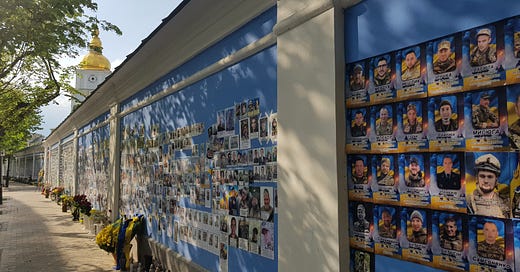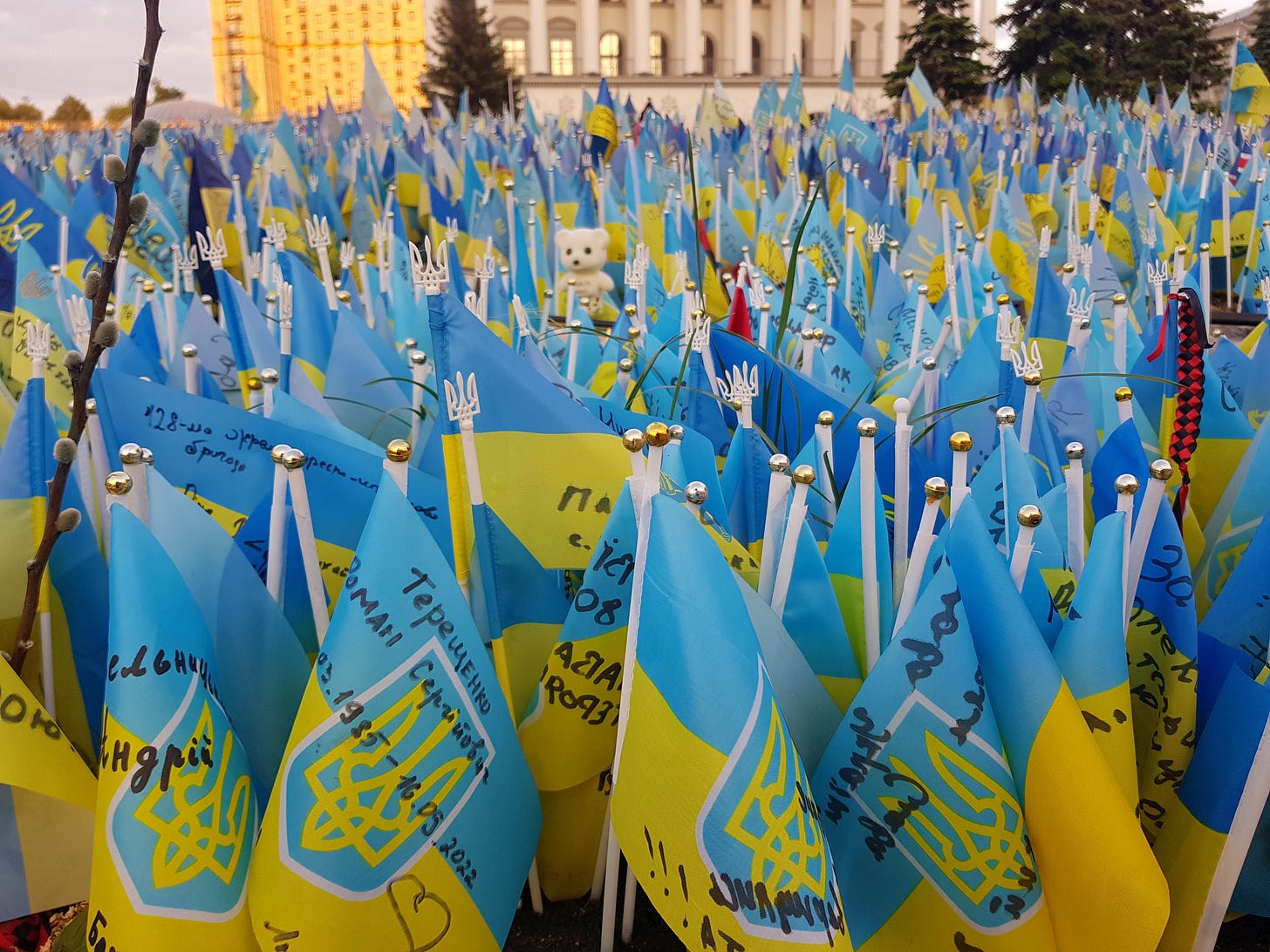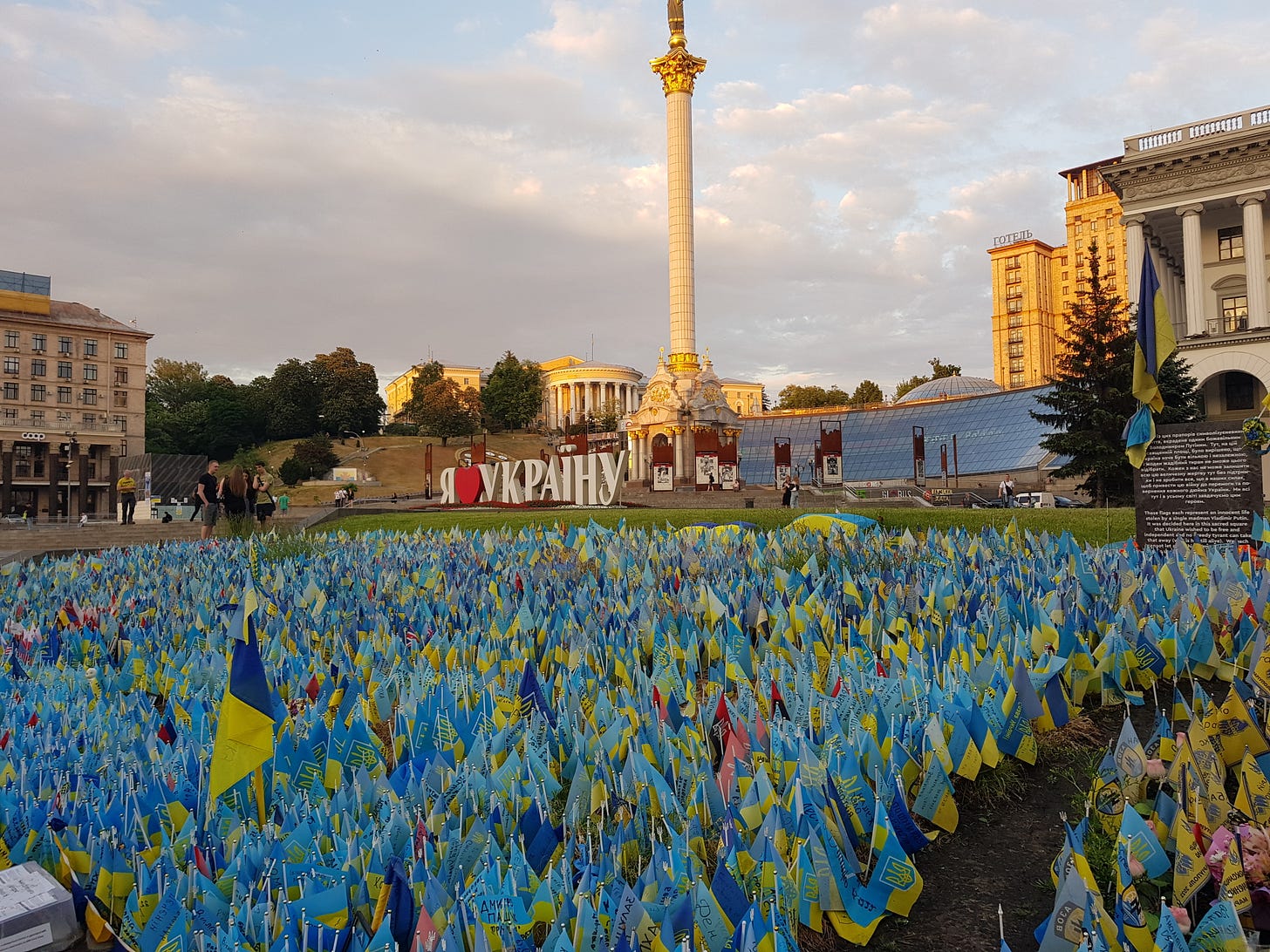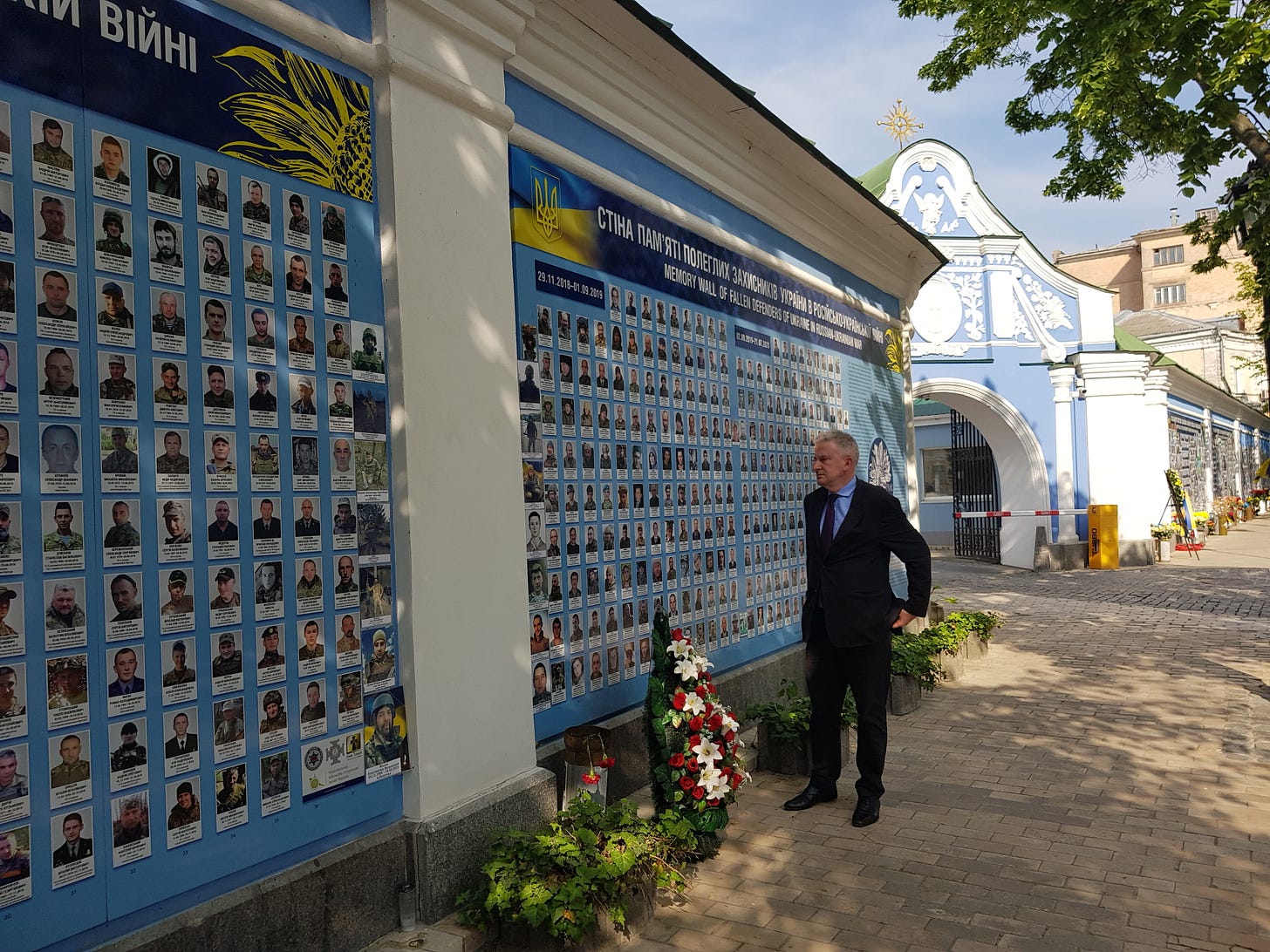The Wall of The Fallen Soldiers 2014-2023—Kyiv, May 25, 2023. Picture Nicolas Tenzer
Ten days ago, I spent three days in Kyiv—speaking at the 15th Kyiv Security Forum—, for the second time since the start of Russia’s all-out war against Ukraine, but my purpose here is not to write a travel diary—all the more so as, in the Ukrainian capital, one could have the deceptive illusion of being far from the front. Life here seems almost normal, were it not for the midnight curfew, regular night-time alerts, imposing checkpoints to gain access to places of power and, alas, all too often still civilian casualties, despite the skies being armored with increasingly effective anti-missile systems. Since I left, Russian attacks on the Ukrainian capital have multiplied: after all, a normal, happy, peaceful life is what the Russians hate most. It is also this normality, this ability to enjoy every moment of happiness—in short, life—that Ukrainians cherish. It’s what they’re fighting for. This simplicity of life is also part of our shared values.
So people go for walks; monuments are open to visitors; the terraces are always full—as are the parks and theaters. I could feel the difference compared to April 2022, when I had entered a city under siege, with almost deserted streets, closed stores and it was almost impossible to spend the night—a city that still bore the scars of the terror and the stench of the mass crimes committed next door in Bucha and Borodyanka.
But in reality, of course, there is no normality. Fear is there, even if it’s overpowering, with most Ukrainians no longer even going to the shelters in case of alarm. Fatigue, even exhaustion, is here for those in the rear, not to mention those fighting directly at the front. Yes, they are overcome, but to think that there would be no trace of them would be to understand nothing of the lasting trauma that a total war imposes on the population undergoing it. No, beyond a few street exhibitions on the atrocities of Mariupol, Izyum, Dnipro and elsewhere, there is no visible presence of death, but death is also omnipresent, so much so is it the evidence of this war. Every time I speak to a Ukrainian, there or elsewhere, I measure this reality: every person is affected, directly or through someone very close to them, by the loss of a son, father, husband or brother—or a mother, sister, wife or daughter—or a dear friend. The dead, more than death as an abstraction for that matter, are there, as are the permanently wounded who will never walk again, see, hear, kiss or find a life that is not a deep night haunted by ghosts.
But perhaps never before have I felt as strongly as I did this time something I had already sensed in my more distant conversations: the extraordinary loneliness felt by Ukrainians, and their difficulty in making others feel not so much their experience, perhaps ultimately untransferable, as the lessons it would impose on a normal world. It’s as if the majority of leaders of democratic states remained on the sidelines and, in so doing, on the bangs of understanding not only the Ukrainian experience, but above all the Russian criminal enterprise.
Pessimism and mistrust
In all the discussions I was able to have in Kyiv, there was first and foremost a strong feeling of pessimism, even if it was never admitted as such. It could certainly be said that pessimism as such is often linked to a deep moral suffering and psychic exhaustion that no one should underestimate—and which is not at all incompatible with either courage or resolution. This is certainly not inaccurate, and it is equally certain that, for a population that feels itself to be living at the bottom of an abyss from which it sees no way out, optimism is not a category of spontaneous, easy experience. This optimism can be forced and highly demonstrative. It can also feed on any sign of weakness on the enemy’s side, but it is ultimately incapable of lasting domination of a nation’s public spirit. Of course, pessimism in no way prevents the most relentless struggle over the long term, and a remarkable and admirable resistance to the worst atrocities—for the Ukrainian army is fighting, and with it the entire population. But this exceptional and permanent struggle, which has been going on for almost a year and a half—and much longer for those engaged in the war since 2014—is being waged at the price of a soul and body exhaustion that no one can minimize.
But this very pessimism and exhaustion would not be what they are without a pervasive sense of loneliness and lack of ability to communicate the reality of things decisively—a fault, incidentally, more of the receiver than the sender. First of all, we must constantly remind ourselves that the Ukrainians are fighting alone and without the support of allies on the ground, beyond the legions of Georgian, Belarussian and other fighters, who are not the regular troops of allied states either. And what’s more, while the Ukrainian army is receiving weapons that have helped to repel the enemy and prevent its victory, this aid is still in short supply. It has been given in dribs and drabs, failing to prevent tens of thousands of casualties and a swift victory that would have been perfectly possible from a military point of view—and politically the right signal to send to Moscow.
And that’s what’s so morally and nervously destructive for Ukrainians: having to constantly thank the Allies for what they’re doing and, at the same time, knowing that they were far from doing their utmost to save Ukraine—in short, from doing their historic duty. Nothing is more painful and ultimately humiliating for President Zelenskyy and the Ukrainian authorities to have to ask for more and more, when it would have been so natural to give them everything spontaneously. Even the support of the democracies “whatever it takes” and “for as long as it takes” remains a form of support that is ultimately weak in view of the intensity of the crimes suffered, and above all it suggests their perpetuation over the long term of a war of extermination whose attenuated manifestations in the perception of world public opinion—no doubt there will be no more Mariupol and Bucha for now—risk leading to a form of acceptance, as if it were acceptable to allow a war to take place in small stages.
I don’t know any more than anyone else how this war will end. Certainly, Russia won’t “win” it, but an incomplete defeat for Moscow would still be a form of victory for the Kremlin, and certainly a defeat for Ukraine. But I know that, beyond the words of gratitude as obligatory—and this “obligation” is undoubtedly as such detestable, as it is not founded by support commensurate with the stake—there will ultimately exist a long-standing mistrust of Western democracies on the part of Ukrainians. And this distrust will ultimately be justified, because not everything will have been done: if everything is not done now, the end result will be the always possible eternal return of crime.
Absolute pessimism is linked to the lack of total determination on the part of democratic countries to put Russia out of action once and for all, as if there could be more important considerations than saving Ukrainian lives right now and avoiding the continual perpetuation of crimes. The reality is, however, that in their heart of hearts, many Ukrainians see this form of perpetuity as a possibility—in fact, they’ve been experimenting with it for the past nine and a half years.
Maidan Square, Kyiv, May 25, 2023. Tribute to the Victims of the Russian War Against Ukraine. Picture: Nicolas Tenzer
The absoluteness of crime
There is another element of tragic distance between the experience of Ukrainians and what they perceive as the marginalization of crime in the understanding of the Russian war against Ukraine in the thinking of democratic leaders. This sidelining of mass crime in the consciousness of democracies reflects a form of estrangement from the experience of Ukrainians, not only emotionally, but also cognitively. It results in a breakdown of what should be a common democratic consciousness, which is being formed today in Ukraine as after the Holocaust, the Tutsi genocide and Srebrenica, against a backdrop of the invasion of their mental space by absolute crime.
In my articles and television appearances, I have often made a point of talking about crime before discussing other considerations about the conduct of the war, Putin’s objectives and our own strategy in general. I have done so, and continue to do so, for one simple reason: in the end, everything boils down to crime. It is crime that is the very reason for the Russian regime, what constitutes its essence and ultimately defines it. Crime and regime are, so to speak, a perfect match. Anyone who sets out to analyze the regime without not only mentioning crime, but also making it its trademark, would fail to understand it, and would be unable to gain a proper grasp of its foreign policy.
But this understanding is also essential for our own strategy: we don’t act in the same way with a regime whose crime is its message as with another with which it is at worst incidental; we don't have the same defeat strategy with it; we don’t have limited war aims with such a regime, but we are objectively opposed to conceiving its absolute defeat.
For the Ukrainians, not only are the dead omnipresent, as I mentioned earlier, but so is the unimaginable nature of the crime committed, a crime beyond human comprehension, a crime equivalent in its nature to the other mass extermination enterprises that have dotted recent history. For them too, the crime is absolutely primary, and from the outset implies both justice as a political act and the impossibility of forgiveness as a moral and historical act. The demand for justice is stronger than anything else; punishment is the act that commands everything, politically, strategically and historically. Everything we talk about in terms of the future, such as Zelenskyy's famous ten-point peace plan, the future relations of democratic countries—and not just Ukraine—with Russia, security guarantees for Ukraine and the ultimate significance of its entry into the European Union. Only the immensity of the crimes committed can fully illuminate the situation.
To tell the truth, these realities are as obvious to me as the fact that the Holocaust ultimately contains the Second World War, whatever else we may say, or that Srebrenica contains the war in the former Yugoslavia. Perhaps I even explain it more radically and systematically than most Ukrainians. But I can’t help noticing the distance between the Ukrainian perception of this issue and the average Western leader’s apprehension of it—sort of like asking a Jewish survivor of the Nazi extermination camps to ignore two of them. Admittedly, the majority of Western leaders have called for the prosecution of war crimes and for a special tribunal to try those responsible for the crime of aggression. But for many, talk of the crime is still rare, all the more so as its reality is, more often than not, removed from the usual strategic considerations, as if judging the crime were a form of desire that could only be satisfied secondarily, or even additionally, and without guarantee, whereas, for the Ukrainians, beyond the supply of arms and entry into the Atlantic Alliance, this is a primordial and primary question. In a way, it’s all very well to give Ukraine more weapons, or even to open up the prospect of membership of the European Union, or even NATO, but there will be no deep sense of security, and no relative appeasement of the torments of the soul, until justice has been done for the crimes committed.
Maidan Square, Kyiv, May 25, 2023. Tribute to the Victims of the Russian War Against Ukraine. Picture: Nicolas Tenzer
Total victory and absolute defeat
The pessimism we’ve been talking about is linked first and foremost to the concrete conditions of the counter-offensive and, inseparably, to Ukraine’s prospects of joining NATO. All discussions in Kyiv revolve around this second point. Concern is growing as we approach the NATO summit scheduled for Vilnius on July 11 and 12. Many fear—and this was also the subject of the discussions I had in Poland at Defence 24 Day, in Slovakia at the Global Security Forum (Globsec) in Bratislava, in Tallinn at the Lennart Meri Conference and in Georgia at the Rondeli Security Conference over the past three weeks—that this summit will not make up for the mistakes made at the NATO summit in Bucharest in April 2008.
There is great concern that no decisive progress will be made either on the Membership Action Plan (MAP) or on security guarantees. In his address to Globsec, French President Emmanuel Macron, while appearing to be personally in favor of Ukraine’s entry into NATO, even though he didn’t state it openly for obvious reasons, could only note the lack of unanimity on this point, and declared his determination to work towards establishing security guarantees either bilaterally or multilaterally. But we are still far from having a clear vision of what this could mean. Nor does there seem to be any agreement to support the proposal I have made at several of these conferences to deploy troops from volunteer NATO or EU countries to the territories already liberated from Ukraine and those soon to be liberated, including Crimea if necessary. Today, regardless of the fate of MAP, this would be the best possible guarantee of security: it would at least enable the reconquered territories to be secured. Russian forces would be forced to think twice about the temptation to strike again on Ukrainian territory. We all know that, without such security guarantees, Ukraine would remain vulnerable for months and years to come.
Despite their courage and fortitude, Ukrainians cannot live with the prospect of their future being shattered once again.
The looming counter-offensive is also the subject of anxious, if rarely public, discussion, although President Zelenskyy often alludes to it with a mixture of necessary confidence and unfeigned dread about the number of casualties it is likely to entail. Today, Ukraine has a strong capacity for tactical surprise, is better armed and its army is increasingly better equipped and trained, even if it is also exhausted. It does not, however, have enough long-range missiles and fighter aircraft to inflict decisive losses in the depths of the enemy’s position. Its number of tanks is also still too limited. American-built F16s—not to be provided though by the US as now, but by some of its allies—and Abrams heavy tanks will only arrive in the autumn, and then again not necessarily in large enough numbers. As things stand, and unless the counter-offensive is postponed, it seems that they will be more useful for the future security of Ukraine than for the projection of forces to reconquer Russian-occupied territories. While some are banking on a possible collapse of the Russian army, others consider that it has taken advantage of the winter and spring to strengthen itself and make up for some of its shortcomings. Scenarios for the current capabilities of Russian forces are fraught with uncertainty.
While the actions carried out in the Belgorod region, on Russian territory, illustrate the bankruptcy of the Russian state and the existence of huge security gaps, betting on the multiplication of these actions deeper into Russian territory would be risky at this stage.
The major fear on the Ukrainian side is that of a largely unsuccessful counter-offensive, i.e., to put it more precisely, a counter-offensive that would certainly win back certain occupied territories, perhaps even Crimea, which would certainly be strategically, legally and politically decisive, but not the whole. We could imagine the Russian-occupied Ukrainian territory shrinking from 13% to 5 or 6%, which would be an apparent “victory”, but in reality would still be a defeat for Ukraine and a semi-victory for Russia, especially if it were to return to a territorial hold roughly equivalent to its own before February 24, 2022. This would mean even more torture, deportations and crimes in the territories still occupied, as well as a continuing violation of international law.
It could also lead to the temptation of certain countries, notably the United States in the run-up to the 2024 elections, to push for negotiations with Moscow on the grounds that Kyiv is unlikely to be able to push the borders back much further and make them fully correspond to those before 2014. It’s true that both Emmanuel Macron on May 31, 2023, and Antony Blinken on June 2, 2023, in Helsinki rightly rejected the idea of a frozen conflict, a complete non-restoration of international law and an exchange of territories for peace—a peace perfectly described by both as both illusory, because it is short-sighted, and false, because it lacks justice. Undoubtedly, the prospect of a protracted war would not only be monstrous for Ukrainians in terms of the number of additional Ukrainian casualties it would entail, but also politically unfavorable for Joe Biden in the run-up to the 2024 presidential election. His opposition would accuse him, not without bad faith, of having spent too much for the results obtained and too little to ensure victory for the Ukraine. No one would understand the inadequate calibration of his support for Ukraine. The middle way has never led to optimal political appreciation.
Meanwhile, the wall of martyred soldiers surrounding St. Michael’s in Kyiv would continue to grow, reviving the prospect of a slow-burning destruction of the Ukrainian nation. Never before has the existence of this nation been so strong, and this one so exemplary; but many doubt deep down that it is absolutely guaranteed. All the support in the world has not destroyed the fear of a possible hundred years of solitude. Only the total defeat of Russia, as a goal shared by democratic nations, will lift this apprehension of terrible isolation—and endless crimes.







